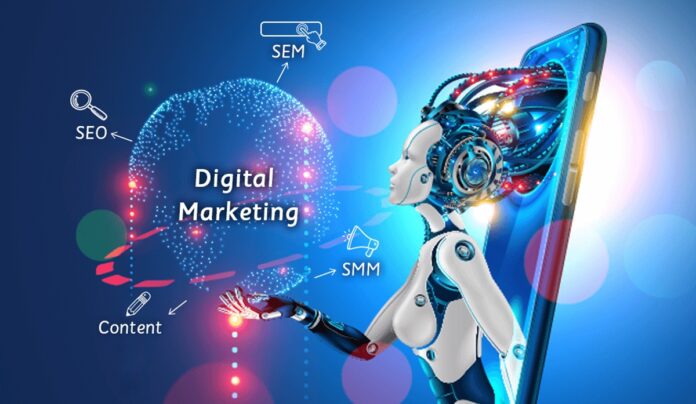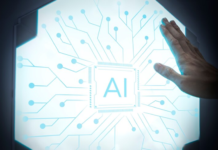AI has powerful abilities to comb through vast troves of customer data in milliseconds, uncovering intricate patterns beyond human means alone. A long time ago, companies used to just show ads on TV and radio hoping people would buy stuff. But now, folks can research anything they want whenever they want before deciding what to get.
That’s because of two things – the internet and phones. As more people got devices, it opened up new ways for companies to talk with customers.
But something even cooler is happening now. Computers are getting really smart with something called artificial intelligence or AI for short. Over 80% of marketing people now use AI to help do their jobs better.
Let’s find out how AI helps target ads, reuse content, and make it easier for folks and companies to connect with each other through their phones and screens.
1. Data Analysis and Insights
Artificial intelligence has powerful abilities to comb through vast troves of customer data in milliseconds, uncovering intricate patterns beyond human means alone. Marketers leverage these insights gained to micro-segment audiences precisely and unveil buying behaviors. AI tools can also help improve SEO strategy by helping you automate data analysis.
While AI aids analysis, human ingenuity stays key to campaigns that authentically resonate. AI augments strategizing by surfacing nuances driving certain subgroups, empowering marketers to tailor appeals to diversifying reach.
2. Chatbots and Virtual Assistants
Have you ever chatted with a bot? These artificial helpers are popping up everywhere online! Brands make chatbots to answer questions quickly on websites and apps. They work like robots you can message them anytime you need help.
When you start typing, chatbots use keywords to give quick replies. The best part is each chat teaches them, so bots get smarter after talking to more people. Customers really appreciate that chatbots are always available for small problems.
For bigger issues, the friendly robot will pass you to a real person. Both customers and employees win – chatbots take some pressure off workers so they can focus on harder queries. What a perfect pairing of people and machines to offer top-notch service around the clock!
3. Ad Targeting and Optimization
Advertisers have a tough job – how do you show people ads they really want to see? That’s where AI comes in handy! It studies what folks click on and search for, quietly noticing patterns. Then it groups audiences by their interests. Marketers can craft personalized messages for each niche it finds.
While keeping everyone’s privacy, AI delivers ads to crowds most likely to appreciate them. It’s like internet matchmaking!
Both brands and people win because ads don’t waste time on the wrong views. Targeting optimizes like this strengthens the bond between complementary businesses and best-fit buyers.
Digital marketing agencies like the Mojo Dojo who operate in Australia and the US believe AI tools available in the market are not capable of creating truly creative and engaging marketing campaigns. Their experiments within Google Ads show that human written ads perform better and get better engagement.
4. Email Marketing Automation
Ever feel buried under a mountain of emails? AI is here to help clear the clutter! Using its robot smarts, AI observes who interacts with newsletters. It notices patterns to group readers by what pulls them in. Then AI turbo charges automation, whipping up customized content for each audience segment.
Emails blast off targeted just right to eager subscribers. For brands, this achieves max impact from every post. For people, only the most wanted messages land in their inbox. AI fine-tunes automation so both marketers and fans get what they really crave – perfectly pitched updates flying straight to sweet spots!
5. Voice Search Optimization
As artificial intelligence enhances voice assistants, folks are chatting with searches more than tapping. Now marketers must adapt too! AI intently listens to what’s being said aloud, detecting patterns. It helps brands tweak key details, like highlights or places, into concise snippets readily understood in brief vocal questions.
When customers voice requests, search engines can respond with optimized solutions right away. AI functions like a translator between searchers and suppliers, connecting spoken needs to neatly tuned products. This vocal optimization allows both people and businesses to win when AI follows engaging listening norms.
6. Dynamic Pricing
Knowing what customers will pay is tricky for any business. Good thing AI is clever with numbers! It watches for patterns in what entices buys online and IRL. Then AI helps vendors test subtle price tweaks anonymously to see what clicks best.
Through constant tuning, AI guides them to sweet spots maximizing profits without busting budgets. Customers come out winners too thanks to personalized deals. With dynamic pricing powered by artificial smarts, retailers and clientele both benefit as supply sensibly dances with differing demands everywhere. It’s a win-win when AI pinpoints pricing perfection.
Summary
In summary, artificial intelligence is transforming digital marketing in powerful yet precise ways. By observing huge troves of consumer data, AI helps uncover nuanced insights that guide highly targeted approaches. Whether through personalized ads, automated emails, dynamic pricing or other optimization, the technology aims to strengthen meaningful connections between businesses and their best-fit customers. Of course, creativity still comes from humans.
But when blended with AI’s analytic abilities, the future of marketing looks bright. Marketers now have supercharged tools to develop deeper understandings and deliver even more engaging experiences for all.















